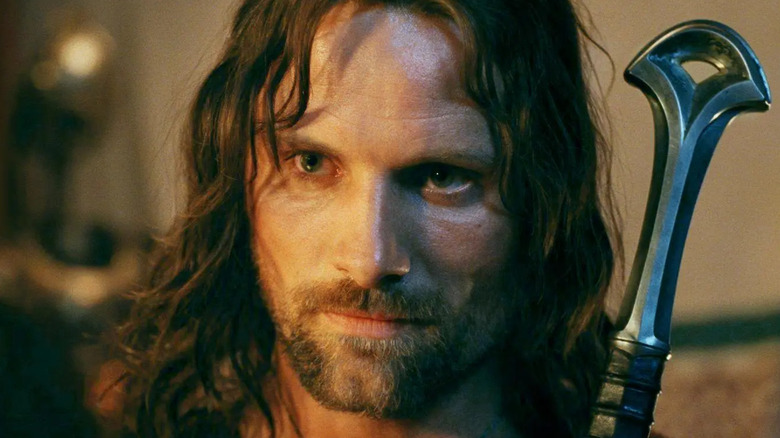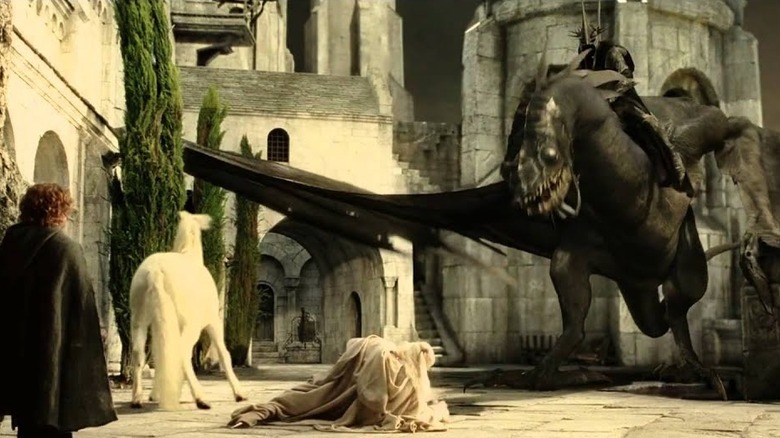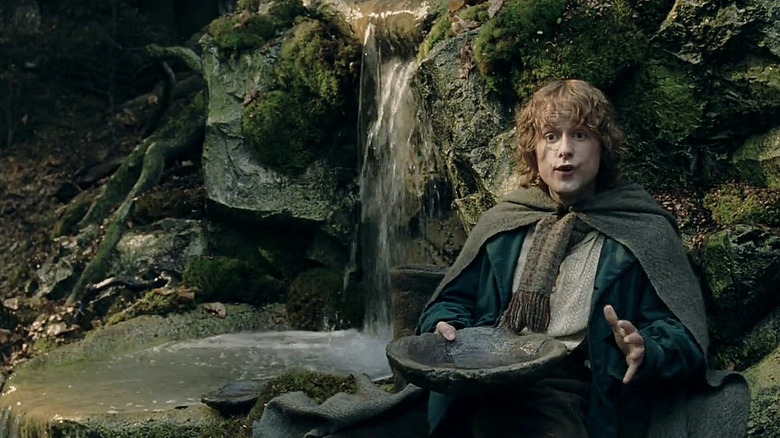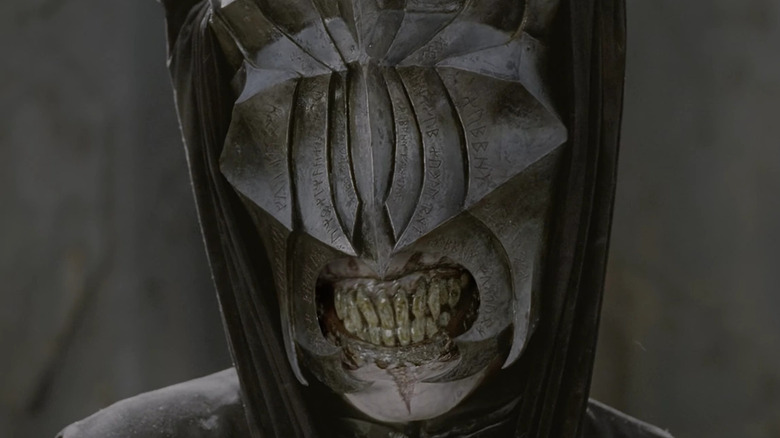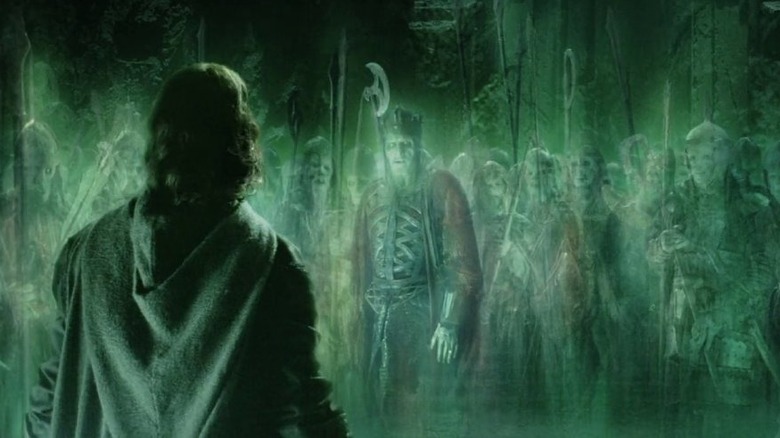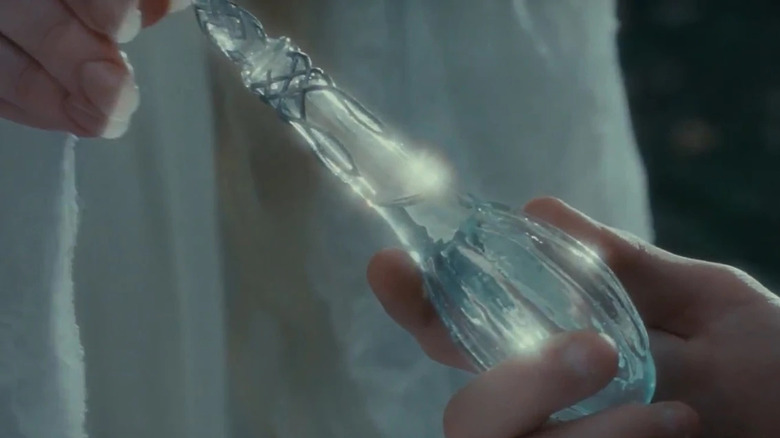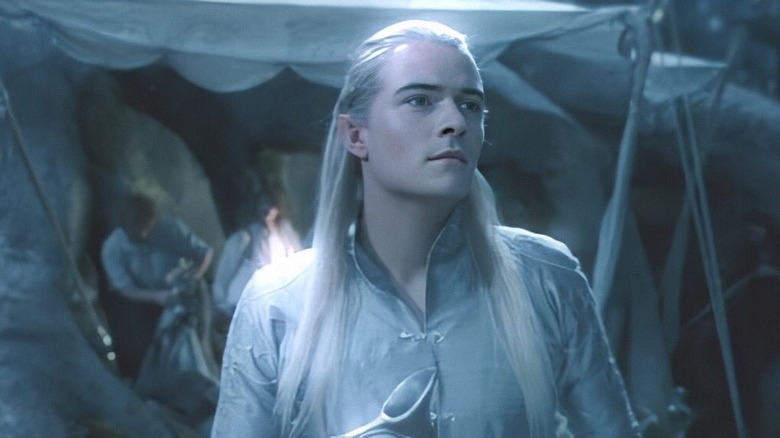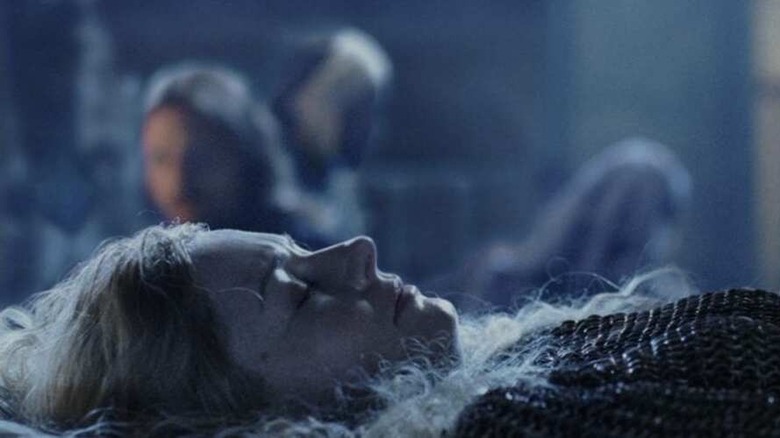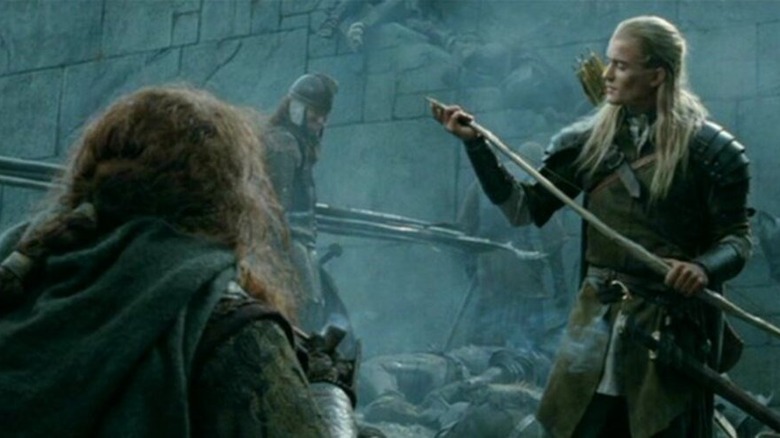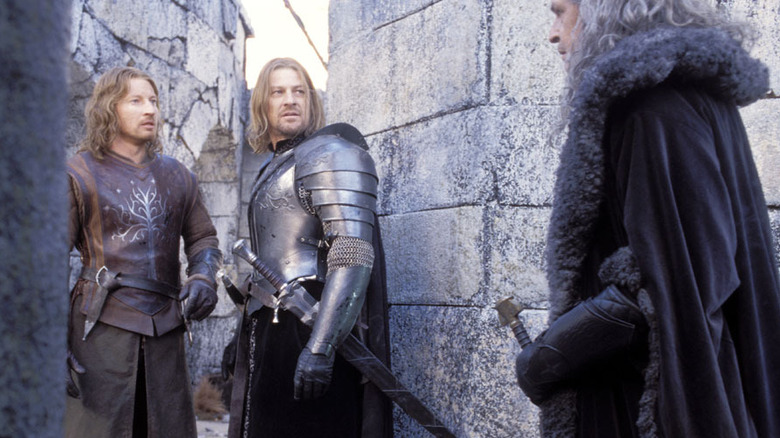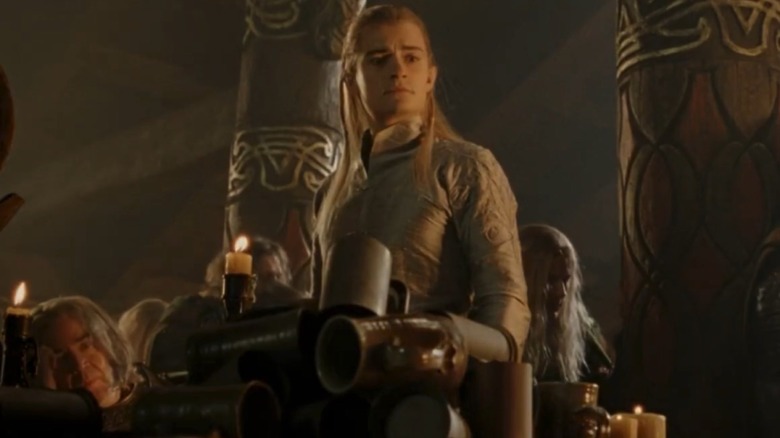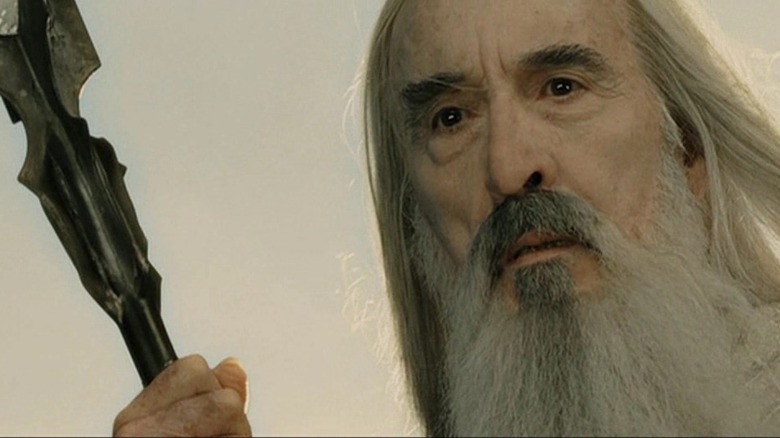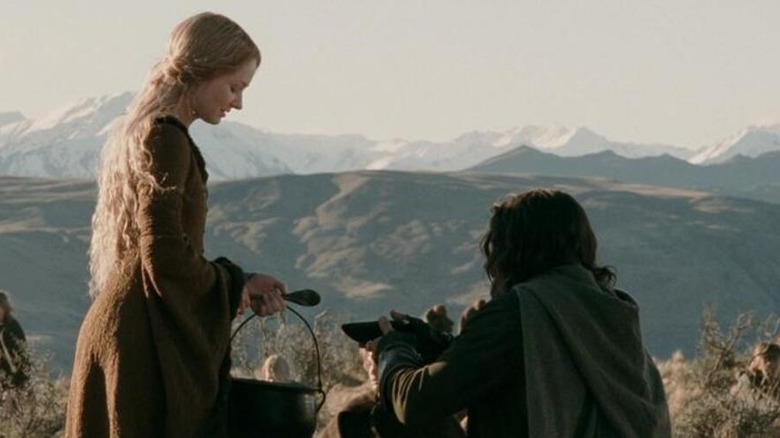The 6 Best And 6 Worst Added Scenes In The Lord Of The Rings Extended Editions
J.R.R. Tolkien's impact and influence on the fantasy genre is seismic, particularly from the author's bestselling "The Lord of the Rings" trilogy, which became not just an iconic piece of literature, but an iconic film trilogy from director Peter Jackson. The epic tale chronicles a hearty band of humans, elves, dwarves, and hobbits assembling a fellowship to destroy a magical ring before to the Dark Lord Sauron can use its power to conquer Middle-Earth. With hobbits Frodo Baggins (Elijah Wood) and Samwise Gamgee (Sean Astin) taking point, the fellowship traverses their fantasy realm on a desperate mission.
While the theatrical version of the trilogy was wildly successful, Jackson and company released extended editions of each of the three films — "The Fellowship of the Ring," "The Two Towers," and "The Return of the King" — on home video. Expanding upon previously existing scenes and adding new ones that were omitted from the theatrical cuts altogether, the extended editions represent Jackson's full adaptation of Tolkien's novels. However, while many of the scenes help provide backstory restore fan-favorite moments that had previously been left by the wayside, not all of the added sequences improve upon the movies as a whole.
Here are all the best and worst scenes found in the extended editions of each of the "Lord of the Rings" movies, from insightful moments that add tremendous depth and breadth, to scenes that would have been better left on the cutting room floor.
Best: Gandalf confronts the Witch-King at Minas Tirith
The Witch-King of Angmar (Lawrence Makoare) is established early in "The Return of the King" as the leader of the Nazgul and one of the most fearsome warriors to come out of Mordor. However, in the theatrical version of the film, the character doesn't do all that much to warrant such a notorious reputation, apart from leading his fellow dark riders into action and slaying King Theoden (Bernard Hill). This changes in the extended edition, with the Witch-King proving himself more than a worthy adversary for Gandalf (Ian McKellen) when the White Wizard races to save Faramir (David Wenham) from a premature pyre.
Intercepting Gandalf and Pippin (Billy Boyd) on the walls of Minas Tirith, the Witch-King causes Gandalf's staff to shatter, with the sudden shock throwing Gandalf from his horse. Before the Nazgul can strike a finishing blow, the sudden arrival of the Rohirrim causes the Witch-King to divert his attention elsewhere as he hears the mounted army approach, sparing the wizard and the hobbit. The added scene underscores the Witch-King's might compared to the theatrical version, in which he was quickly slain by Eowyn (Miranda Otto) after killing Theoden in a sneak attack.
Worst: Merry and Pippin drink the Ent-Draught
In many respects, Merry (Dominic Monaghan) and Pippin serve as the comedic relief throughout the trilogy, though their antics ultimately help the heroes triumph over the forces of darkness. For much of "The Two Towers," the two hobbits are in the care of Ents, gigantic sentient trees living within Fangorn Forest who are initially oblivious to the wider conflict. In the extended edition, a brief respite for Merry and Pippin after being rescued by the Ents within a tranquil forest grove results in a comedic scene that completely falls flat and adds little to the story.
Treebeard (Jonathan Rhys Davies), the leader of the Ents, leaves Merry and Pippin in a clearing after saving them from their vicious orc captors. The two hobbits discover a magical pool of water, dubbed the Ent-Draught, which causes them to grow in stature. It doesn't take long for them to start racing to drink as much as they can in an effort for each to grow taller than the other. This slapstick scene goes on a bit too long, ultimately feeling both out of place and lacking in payoff after Pippin discovers the effects of the Ent-Draught are temporary at the end of the film.
Best: The Mouth of Sauron taunts the Fellowship at the Black Gate
In the theatrical version of "The Return of the King," the Black Gate at the border of Mordor opens when Aragorn (Viggo Mortensen) leads a coalition to distract Sauron's attention from Frodo and Sam. This climactic battle has a brief overture from the Mouth of Sauron (Bruce Spence) in the extended edition, leading directly into the sweeping skirmish between the forces of good and evil. Riding out from the Black Gate, the Mouth of Sauron displays Frodo's mithril vest, taunting Aragorn and leading the Fellowship to believe a grim fate had befallen the hobbit in a cruel attempt to break their spirit.
Aragorn is nonplussed by the revelation and cleaves the Mouth of Sauron's head clean off before rallying his army into a desperate charge on the Black Gate. The added scene further demonstrates the faith that Aragorn has placed in Frodo, even presented with evidence that his friend may have already failed at tremendous cost. In addition to the Fellowship's reaction, the scene also gives Sauron a physical presence to interact with, rather than continuing to relegate him as a fiery eye hovering over Mordor. In doing so, the scene with the Mouth of Sauron makes him a more fully realized antagonist.
Worst: Aragorn's extended recruitment of the Army of the Dead
Aragorn is able to save Minas Tirith and drive back the forces of Mordor thanks to an undead army he recruits after venturing into the Paths of the Dead with Gimli and Legolas (Orlando Bloom). In the theatrical version, Aragorn's petition to the King of the Dead goes unanswered on-screen, leaving the audience in suspense until they arrive at Osiligiath to attack the orc army from behind. By delaying that reveal, the sudden appearance of a ghost army just in time to turn the tide of battle becomes a rousingly satisfying surprise. There are two sequences added to the extended edition of "The Return of the King" that completely undercut this sense of tension, with the more egregious involving the Corsairs of Umbar.
The Corsairs are a group of twisted men in league with Sauron, whose armada is intended to bolster Mordor's ongoing siege of Minas Tirith. In the extended scene, Aragorn and his friends confront the dark fleet as it approaches the river to Osgiliath, bidding them to surrender before being laughed at by the raiders. To the Corsairs' horror, they are swiftly vanquished by the Army of the Dead, eliminating any doubt that Aragorn will be coming to Minas Tirith with spectral reinforcements and needlessly explaining how the group acquired the warships to stage their surprise attack.
Best: Galadriel presents the Fellowship with gifts
After being granted safe passage through the elven realm of Lothlorien, the members of the Fellowship continue their journey towards Mordor by river on canoes gifted to them by the elves. The Fellowship is also seen wearing matching green cloaks with leaf-shaped brooches, though there is no further explanation given in the theatrical version. This is expanded upon in the extended edition of "The Fellowship of the Ring," with Galadriel (Cate Blanchett) providing several members of the Fellowship with additional gifts not seen in the theatrical cut.
From the group being gifted the magical lembas bread to Legolas receiving a finely crafted bow, Galadriel is seen providing presents to several of the heroes with a brief explanation behind their importance. On a quietly sentimental note, Gimli confides to the others that he asked Galadriel for a strand of her hair, and she gave him three, allowing the character a moment of vulnerability and warmth toward the elves he's so distrusted. More importantly, the scene has Galadriel give Frodo the Light of Elendil, which figures more prominently in "The Return of the King" as he navigates Shelob's lair and attempts to escape the gigantic spider.
Worst: Sam provides an impromptu eulogy for Gandalf
The most shocking moment in "The Fellowship of the Ring" is the apparent death of Gandalf as the wizard holds off the fiery Balrog while the rest of the Fellowship flees from the mines of Moria. With Gandalf such a beloved figure across Middle-Earth, including among the hobbits, the Fellowship is shaken to their core by losing the grey wizard. Though there is a heartbreaking scene in the theatrical cut of the Fellowship mourning Gandalf's death before entering the forest of Lorien, an added scene set during the following night eulogizes the wizard with considerably less emotional effectiveness.
As the Fellowship rests for the night among the elves of Lothlorien, Sam takes it upon himself to deliver a tribute to Gandalf in the form of a poem. Standing before his grieving friends, Sam praises Gandalf's penchant to entertain the hobbits with fireworks in a series of rhymes before awkwardly sitting back down. While the scene showcases just how clumsily genuine and poignant Sam can be, it succeeds in feeling just as abruptly intrusive as it appears to the rest of the Fellowship while they recuperate from their ordeal in Moria.
Best: Aragorn heals Eowyn in the House of Healing
After taking down the Witch-King at the Battle of Pelennor Fields, Eowyn is conspicuously absent during the Battle of the Black Gate at the climax of "The Return of the King." She's last seen in the film trilogy at Faramir's side as Aragorn is crowned King of Gondor, with the tale of how the apparent couple first met untold in the theatrical version. This backstory is revealed in the extended edition, as is what became of Eowyn in the immediate aftermath of the battle to save Minas Tirith from Mordor.
After finding Eowyn gravely wounded on Pelennor Fields, Aragorn takes the shieldmaiden of Rohan to the Houses of Healing, where he personally utilizes his medical expertise to save her life. As Aragorn leads the able-bodied soldiers of Gondor and Rohan to march on the Black Gate, Eowyn recuperates at the Houses of Healing. That's where she meets Faramir, who has recovered from his own injuries. The scene provides a welcome breather from all the sweeping fantasy battles in the final act of "The Return of the King" while explaining how exactly Eowyn and Faramir got their own happy ending together.
Worst: Gimli and Legolas compare their final tallies at Helm's Deep
While initially being introduced as bitter rivals due to the ancient animosity between the elves and dwarves, Legolas and Gimli strike up a close, if competitive, friendship across the trilogy. This burgeoning camaraderie between the two warriors is underscored by the their banter during the Battle of Helm's Deep in "The Two Towers," which finds them keeping score of how many orcs they've each killed. Though the defenders emerge triumphant and drive back the forces of Isengard, the final comparative tally between Gimli and Legolas is not included in the theatrical version of the film.
The extended edition of "The Two Towers" adds a short scene as Gimli and Legolas reunite in the immediate aftermath of the battle to compare how they each did in the skirmish. As Legolas smugly announces he killed 41 orcs defending Helm's Deep, Gimli undercuts this figure by revealing he slew 42 during the same battle. While providing an amusing moment for Gimli to literally one-up Legolas, the kill count seems head-scratchingly low when accounting that Legolas already had nearly 20 kills before the fortress' deeping wall was breached.
Best: Faramir's flashback of Boromir retaking Osgiliath
Faramir takes on a slightly more antagonistic role in "The Two Towers" than he does in the books, deciding to detain Frodo and Sam while planning to use the One Ring of Power for the glory of Gondor. The young warrior's motivations are elaborated on in "The Return of the King," showing that Faramir is constantly belittled by his father Denethor (John Noble) in comparison to his older brother Boromir (Sean Bean). This dysfunctional family dynamic is explored more fully in a flashback sequence included in the extended edition of "The Tower Towers" as Faramir contemplates his options.
In a private moment, Faramir recalls Boromir leading the forces of Gondor to reclaim the border city of Osgiliath from Mordor, with Denethor praising his eldest son while scorning the younger. The scene provides a glimpse into Faramir's unhappy family life and his close relationship with his brother, informing his actions in the trilogy. With Faramir first seen in "The Return of the King" losing Osgiliath to Mordor, the flashback in the preceding film makes this defeat all the more heartbreaking — Faramir cannot escape the specter of Boromir's prior victory.
Worst: The Fellowship celebrates back at Edoras
After successfully defending Helm's Deep and investigating Isengard, the Rohirrim regroup at Rohan's capital of Edoras at the start of "The Return of the King." The theatrical version of the film has the defenders somberly toast those who gave their lives in service to Rohan before retiring for the evening. The extended edition expands on the festivities as the Rohirrim celebrate their victory more uproariously after the toast, in a scene that offers little to the narrative and ends on a mildly confusing note after an unnecessary comedic sequence.
In the scene, Gimli and Legolas face off in a good-natured drinking game while Merry and Pippin entertain their intoxicated hosts with a quick song-and-dance number on top of the banquet hall's table. As their song comes to an end, Pippin notices Gandalf staring at him with visible concern, perhaps sensing Pippin's quiet obsession with the Palantir that they previously recovered from Isengard. Ultimately, the comedic flourishes aren't particularly funny or revealing about the characters involved, and Gandalf's appearance here brings awkward foreboding that the theatrical cut wisely avoids altogether and just keeps the film moving steadily along.
Best: Saruman is killed by Grima Wormtongue
One of the biggest loose ends in the theatrical version of the "Lord of the Rings' trilogy is the fate of Saruman (Christopher Lee), the White Wizard of Isengard and traitorous ally to Sauron. After Isengard is cleansed by the Ents and Saruman's army is vanquished at Helm's Deep, Gandalf leads the Rohirrim to Saruman's tower of Orthanc, but deems him to no longer be a threat. Thus, the imposing antagonist who's been building in menace and power throughout the first two chapters of the trilogy is suddenly hand-waved away with a dismissive line of dialogue and left to sit in his tower. This sentiment is absent in the extended edition of "The Return of the King," with Gandalf warning his friends that Saruman is indeed still incredibly dangerous before the villainous wizard confronts his adversaries.
Saruman appears on top of Orthanc and attempts to parlay to Theoden for clemency, only to be rebuffed by the vengeful king for all the carnage he's inflicted upon Rohan. As Saruman taunts the assembled heroes while gazing into his Palantir, his associate Grima Wormtongue (Brad Dourif) stabs him in the back after Saruman strikes him. Legolas kills Wormtongue with an arrow as the dead wizard tumbles from Orthanc and lands on a spike at the base of the tower, giving the villain his gruesome comeuppance.
Worst: Aragorn reveals his true age to Eowyn
As one of the Dunedain, the last descendants of Isildur, Aragorn is the heir to the throne of Gondor and the legacy of the Numenor, the majestic human kingdom from Middle-Earth's Second Age. One of the hereditary traits of the Dunedain is a prolonged lifespan, with those of Isildur's lineage aging significantly more slowly than the rest of their human counterparts. This detail remains undisclosed in the theatrical version of the trilogy, but Aragorn's unique genetics are revealed in an extended edition scene that is completely deflated by unnecessary and clumsy attempts at humor.
In the extended edition of "The Two Towers," Eowyn offers Aragorn some soup she's prepared while they're working together to escort the refugees from Edoras to Helm's Deep. As Aragorn attempts to conceal his disgust over the poor quality of Eowyn's soup, he admits that he is 87 years old, with Eowyn quickly deducing he is one of the Dunedain. Though the scene helps shed more light on Aragorn's kingly heritage, Strider's comical attempts to subtly dispose of the soup without hurting Eowyn's feelings come off as jarringly out of place.
